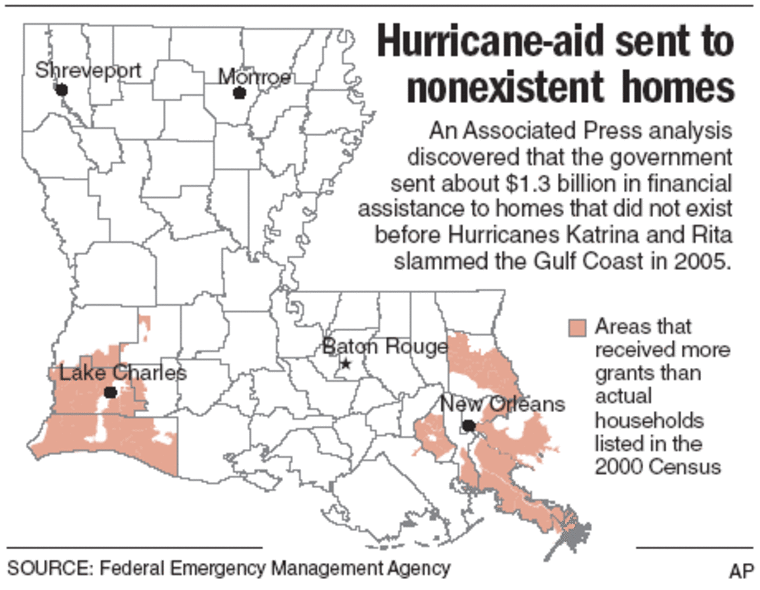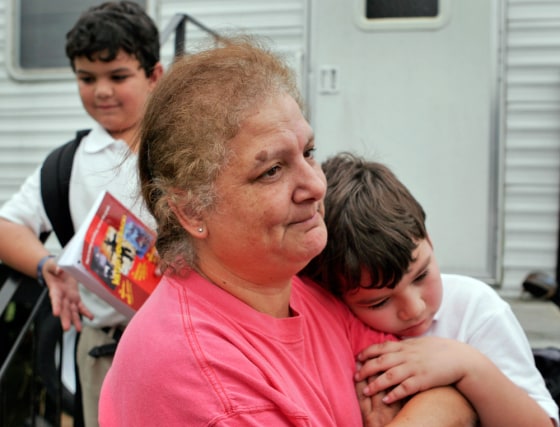In the neighborhood President Bush visited right after Hurricane Katrina, the U.S. government gave $84.5 million to more than 10,000 households. But census figures show fewer than 8,000 homes existed there at the time.
Now the government wants back a lot of the money it disbursed across the region.
The Federal Emergency Management Agency has determined nearly 70,000 Louisiana households improperly received $309.1 million in grants, and officials acknowledge those numbers are likely to grow.
In the chaotic period after two deadly hurricanes, Katrina and Rita, slammed the Gulf Coast in 2005 — Katrina making landfall in late August, followed by Rita in late September — federal officials scrambled to provide help in hard-hit areas such as submerged neighborhoods near the French Quarter.
But an Associated Press analysis of government data obtained under the federal Freedom of Information Act suggests the government might not have been careful enough with its checkbook as it gave out nearly $5.3 billion in aid to storm victims. The analysis found the government regularly gave money to more homes in some neighborhoods than the number of homes that actually existed.
The pattern was repeated in nearly 100 neighborhoods damaged by the hurricanes. At least 162,750 homes that didn’t exist before the storms may have received a total of more than $1 billion in improper or illegal payments, the AP found.
The AP analysis discovered the government made more home grants than the number of homes in one of every five neighborhoods in the wake of Katrina. After Rita roared ashore, there were more home grants than homes in one of every 10 neighborhoods.
“We don’t dispute that more households received expedited assistance in certain zip codes than are listed in the 2000 Census,” said David Garratt, FEMA’s deputy director for recovery. But he called this “not only justifiable, it’s defensible.”
Hundreds already prosecuted
Officials say a substantial number of those payments — they cannot say precisely how many — were made legitimately to homes where family members were separated after the storm, such as emergency workers who stayed behind as spouses and children fled. In such cases, a single family could qualify for more than one aid package. Garratt said officials were in a no-win position.
“We were faced with a situation where we had individuals who needed assistance, and needed it now,” he said. “If we’d followed the standard procedures, it would have taken weeks.”
Garratt acknowledged FEMA wasn’t prepared to verify the identities and homes for everyone who needed help. He said the agency had multiple safeguards to ensure proper payments were made to people who applied online. But a new system designed to keep a tight rein on payments to people who telephoned their applications to FEMA was only partially finished when the storms hit, he said.

The Justice Department so far has prosecuted more than 400 people for storm-related fraud, and $18 million has been returned to FEMA or the American Red Cross, according to a recent report by the department’s Katrina Fraud Task Force.
The bulk of prosecutions have occurred in Louisiana (115), California (79), Texas (50) and Mississippi (46). The amount recovered so far, however, is slight compared with estimates of widespread fraud.
Among those already prosecuted: Lakietha Diann Hall, 35, of Dallas. Prosecutors said Hall and 10 others — including her mother — filed fraudulent assistance applications over the Internet claiming damage to her home in New Orleans. Hall, who authorities said never lived in Louisiana, received $65,000 in disaster aid, court records show.
The New Orleans apartment complex where Hall claimed she lived was in a neighborhood of 18,100 homes before the storm; FEMA records show the government gave money to more than 21,000 homes there after Katrina.
Hall pleaded guilty to identity theft. She was sentenced in November to 70 months in prison and ordered to pay $100 each month until she repays the U.S. government $83,254 — a court-imposed payment plan that will take nearly 70 years. Her co-defendants were sentenced to anywhere from probation to one year in prison.
ZIP code abuse
Prosecutors also charged Nakia Grimes of Atlanta, who collected $2,000 in emergency aid after she claimed her home near the Louisiana Superdome was damaged. Grimes listed her ZIP code as one reserved for P.O. boxes in that part of New Orleans — and she was one of three such people who received a total of $6,358 in checks. Grimes’ check was mailed the same day she filled out her Internet application, court records show.
Investigators said Grimes, 31, also never lived in New Orleans. In March 2006, she was convicted of mail fraud, sentenced to four months’ home detention and ordered to pay a $100 fine.
Census figures showing the number of households within ZIP codes don’t always correspond precisely with the post office ZIP codes where FEMA sent grant money. But the AP’s findings are similar to those of a February report by the Government Accountability Office, which found hurricane aid was used for to pay for guns, strippers and tattoos. The GAO concluded that between $600 million and $1.4 billion was improperly spent on Katrina relief alone.
Home in a cemetery?
In one neighborhood GAO scrutinized, at least one person gave an address as a cemetery. Records show FEMA gave 27,924 assistance grants worth $293 million in that neighborhood. The AP’s analysis shows only 18,590 homes existed, meaning up to $98 million in aid could have been disbursed improperly or illegally.

Other agencies have moved at a more cautious and deliberate pace awarding assistance money.
The Louisiana Road Home program has handed out fewer than 400 grants to help homeowners return — even though it’s received more than 100,000 applications and is under increasing pressure from the governor and anxious homeowners. The Small Business Administration also got off to a slow start, cutting its first check more than a month after Katrina made landfall, despite receiving more than 26,000 applications.
Some south Louisiana residents said fraud was endemic in the chaotic days after the storms. Rick Caravalho, a local man walking across the French Quarter’s Jackson Square on a recent morning, described it as “phenomenal.” Caravalho lives close to where Bush acknowledged disappointed storm victims during his visit in September 2005.
A government official, Caravalho laughed, recently “was at the front door asking where 2003 Chartres Street was.”
“There is no 2003 Chartres Street,” he said. “It’s a vacant lot.”
'Gave away the money too fast'
In St. Bernard Parish, close to where Katrina made landfall south of New Orleans, the floodwaters rose above 20 feet and white FEMA trailers are still parked outside almost every house. Residents there told the same story. Martina Wiggins, waiting for her grandchildren to arrive home from school, said she was denied aid because someone had already applied using her address.
“They gave away the money too fast,” Wiggins said bitterly. “A lot of people got money who didn’t deserve it.”
People who were forced to flee their homes were eligible for a wide range of federal help, ranging from rental assistance to $2,000 debit cards that could be used to replace personal possessions and buy food. Household payments were capped at $26,000.
Under agency rule changes about three weeks after Katrina, FEMA officials decided some separated households could receive aid. These exceptions included adult roommates who were separated, extended families and some adults still living with their families who were forced to evacuate separately. The government considers a “household” to represent all the people — related or otherwise — who live in a housing unit such as a house, apartment or mobile home.
Rules ‘uneven and arbitrary’
Still, advocates said thousands of people in separated homes were improperly denied aid or never heard about the rule change.
Catherine Bendor of the National Law Center on Homelessness and Poverty said a federal court ruling in June criticized FEMA for not giving enough information to people applying for aid. But coming nearly a year after the storm, she said, the ruling comes too late for the majority of people who needed help.
“The application of the rule has been uneven and arbitrary,” she said. “It appears they were making decisions on a case-by-case basis. So it’s caused a lot of frustration. There were a lot of individuals who never should have been denied assistance.”
'They ain’t no help now'
In some cases, FEMA is still trying to collect refunds from individuals who improperly received more than one grant or who were ineligible for assistance. But for people like Keshian Mitchell, a 17-year-old Katrina refugee living in a dismal apartment complex in west Houston, it’s small comfort.
“They ain’t no help now,” said Mitchell, who didn’t find her parents until six months after Katrina laid waste to New Orleans. “Nobody’s getting any more help — they already spent all the money.”
Crystal Dixon, who lives near Mitchell, agreed. Dixon, 25, said she saw people bilk taxpayers while she fought for basic assistance to help feed and clothe her five children, ages 1 to 10.
She met one woman who had moved to Houston two years before the storm but kept her Louisiana driver’s license. The woman, who had no children, got cash assistance before Dixon was helped, Dixon said.
“I try to understand how confused things got,” said Dixon. Her children played outside and chattered excitedly about nearly falling off a roof into flood-swollen streets, being rescued by a Coast Guard helicopter and scrounging for food and water at the overcrowded Superdome. “But I thought everyone should have been treated equally.”
Cedric Miller, a 34-year-old busboy at a New Orleans restaurant, said FEMA officials seemed to be reacting as best they could to the devastation. But Miller also said: “There was a lot of fraud going on. ... There was a whole lot of that going on. It was a big ol’ way-drawn-out mess.”
